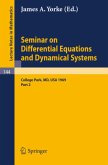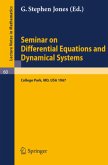In recent years considerable interest has developed in the mathe matical analysis of chemically reacting systems both in the absence and in the presence of diffusion. Earlier work has been limited to simple problems amenable to closed form solutions, but now the computer permits the numerical solution of complex systems of nonlinear differ ential equations. The numerical approach provides quantitative infor mation, but for practical reasons it must be limited to a rather narrow range of the parameters of the problem. Consequently, it is desirable to obtain broader qualitative information about the solutions by in vestigating from a more fundamental mathematical point of view the structure of the differential equations. This theoretical approach can actually complement and guide the computational approach by narrow ing down trial and error procedures, pinpointing singularities and suggesting methods for handling them. The study of the structure of the differential equations may also clarify some physical principles and suggest new experiments. A serious limitation ofthe theoretical approach is that many of the results obtained, such as the sufficient conditions for the stability of the steady state, turn out to be very conservative. Thus the theoretical and computational approaches are best used to gether for the purpose of understanding, designing, and controlling chemically reacting systems. The present monograph is intended as a contribution to the theory of the differential equations describing chemically reacting systems.
Hinweis: Dieser Artikel kann nur an eine deutsche Lieferadresse ausgeliefert werden.
Hinweis: Dieser Artikel kann nur an eine deutsche Lieferadresse ausgeliefert werden.








